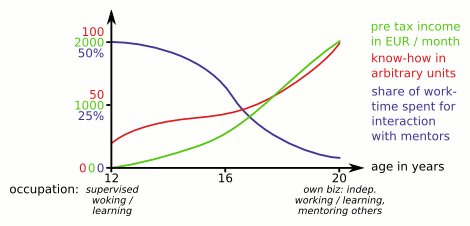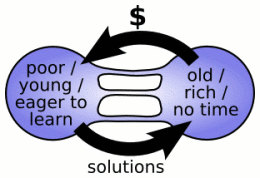
|
Main /
Application: EducationLearning tradeTag trade and similar systems could allow people to learn how to trade on a small scale, without much risk. Young people may appreciate the fact that for pursuing tasks they get a tangible reward, and not an artificial one such as a grade in school. Furthermore, tag trade systems help learners gain experience that they could later apply, for example when joining larger projects as free lancers, or when building their own business.  A hypothetical career, optimistically illustrating application of tag trade in education as a ramp into autonomy. Being liberatedPayment liberates, if it allows learners to pursue what they are interested in. Especially in developing countries people may not have the resources to pursue interests if they won't receive a quick return. In this case, generous solution seekers could be of help: When specifying a task, they could limit pay, for example, to people below a certain age that live in a certain set of countries. In countries with poor Internet access, mentors could help learners to find open tasks, and give them guidance. These mentors could for example be experienced "tag traders". As of October 2006, however, there is no tag trade specification that allows encoding constraints as those mentioned above in machine readable form. Similarly, there is no way for solution providers to integrate detailed personal information, such as age and certified skills, into a tag trade system. Helpful could be a specification describing how to make tag trade meta data part of the semantic web. That way, meta data such as that in FOAF could be easily integrated.  Liberation in education, simplified. Discussion
|